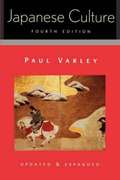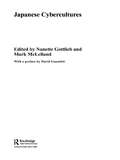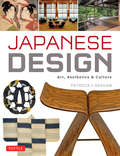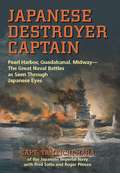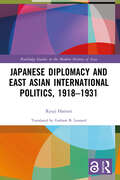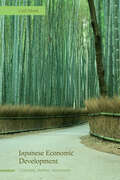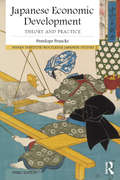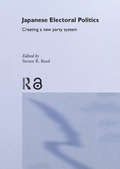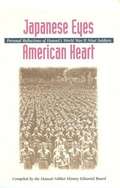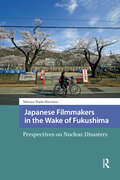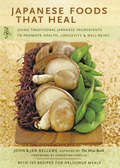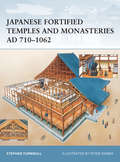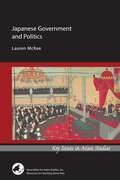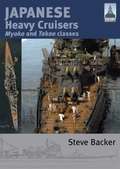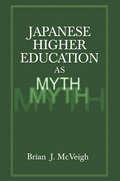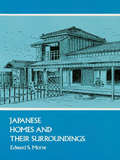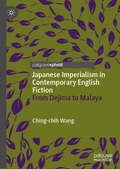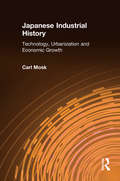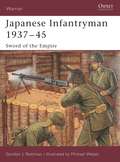- Table View
- List View
Japanese Culture (Fourth Edition)
by Paul H. VarleyAn introduction to Japanese history and culture. This fourth edition includes expanded sections on numerous topics, among which are samurai values, Zen Buddhism, the tea ceremony, Confucianism in the Tokugawa period, the story of the 47 ronin, and mass culture in contemporary times.
Japanese Cybercultures (Asia's Transformations/Asia.com)
by Nanette Gottlieb Mark McLellandJapan is rightly regarded as one of the most technologically advanced countries in the world, yet the development and deployment of Internet technology in Japan has taken a different trajectory compared with Western nations. This is the first book to look at the specific dynamics of Japanese Internet use. It examines the crucial questions:* how the Japanese are using the Internet: from the prevalence of access via portable devices, to the fashion culture of mobile phones* how Japan's "cute culture" has colonized cyberspace* the role of the Internet in different musical subcultures* how different men's and women's groups have embraced technology to highlight problems of harassment and bullying* the social, cultural and political impacts of the Internet on Japanese society* how marginalized groups in Japanese society - gay men, those living with AIDS, members of new religious groups and Japan's hereditary sub-caste, the Burakumin - are challenging the mainstream by using the Internet.Examined from a variety of interdisciplinary perspectives, using a broad range of case-studies, this is an exciting and genuinely cutting-edge book which breaks new ground in Japanese studies and will be of value to anyone interested in Japanese culture, the Internet and cyberculture.
Japanese Design
by Patricia J. GrahamWhat exactly is the singular attraction of Japanese design? And why does it speak so clearly to so many people all over the world? The Japanese sensibility often possesses an intuitive, emotional appeal, whether it's a silk kimono, a carefully raked garden path, an architectural marvel, a teapot, or a contemporary work of art. This allure has come to permeate the entire culture of Japan-it is manifest in the most mundane utensil and snack food packaging, as well as in Japanese architecture, and fine art. In Japanese Design, Asian art expert and author Patricia J. Graham explains how this aesthetic based in fine craftsmanship and simplicity developed. Her unusual, full-color presentation reveals the Japanese design aesthetic in an absorbing way, using a combination of insightful explanations and more than 160 stunning photos. Focusing upon ten elements of Japanese design, Graham explores how visual qualities, the cultural parameters and the Japanese religious traditions of Buddhism and Shinto have impacted the appearance of its arts. Japanese Design is a handbook for the millions of us who have felt the special allure of Japanese culture, crafts, and art. Art and design fans and professionals have been clamoring for this-a book that fills the need for an intelligent, culture-rich overview of what Japanese design is and means.
Japanese Design
by Patricia J. GrahamWhat exactly is the singular attraction of Japanese design? And why does it speak so clearly to so many people all over the world? The Japanese sensibility often possesses an intuitive, emotional appeal, whether it's a silk kimono, a carefully raked garden path, an architectural marvel, a teapot, or a contemporary work of art. This allure has come to permeate the entire culture of Japan-it is manifest in the most mundane utensil and snack food packaging, as well as in Japanese architecture, and fine art.In Japanese Design, Asian art expert and author Patricia J. Graham explains how this aesthetic based in fine craftsmanship and simplicity developed. Her unusual, full-color presentation reveals the Japanese design aesthetic in an absorbing way, using a combination of insightful explanations and more than 160 stunning photos. Focusing upon ten elements of Japanese design, Graham explores how visual qualities, the cultural parameters and the Japanese religious traditions of Buddhism and Shinto have impacted the appearance of its arts.Japanese Design is a handbook for the millions of us who have felt the special allure of Japanese culture, crafts, and art. Art and design fans and professionals have been clamoring for this-a book that fills the need for an intelligent, culture-rich overview of what Japanese design is and means.
Japanese Design
by Patricia J. GrahamWhat exactly is the singular attraction of Japanese design? And why does it speak so clearly to so many people all over the world? The Japanese sensibility often possesses an intuitive, emotional appeal, whether it's a silk kimono, a carefully raked garden path, an architectural marvel, a teapot, or a contemporary work of art. This allure has come to permeate the entire culture of Japan-it is manifest in the most mundane utensil and snack food packaging, as well as in Japanese architecture, and fine art. In Japanese Design, Asian art expert and author Patricia J. Graham explains how this aesthetic based in fine craftsmanship and simplicity developed. Her unusual, full-color presentation reveals the Japanese design aesthetic in an absorbing way, using a combination of insightful explanations and more than 160 stunning photos. Focusing upon ten elements of Japanese design, Graham explores how visual qualities, the cultural parameters and the Japanese religious traditions of Buddhism and Shinto have impacted the appearance of its arts. Japanese Design is a handbook for the millions of us who have felt the special allure of Japanese culture, crafts, and art. Art and design fans and professionals have been clamoring for this-a book that fills the need for an intelligent, culture-rich overview of what Japanese design is and means.
Japanese Design
by Patricia J. GrahamWhat exactly is the singular attraction of Japanese design? And why does it speak so clearly to so many people all over the world? The Japanese sensibility often possesses an intuitive, emotional appeal, whether it's a silk kimono, a carefully raked garden path, an architectural marvel, a teapot, or a contemporary work of art. This allure has come to permeate the entire culture of Japan-it is manifest in the most mundane utensil and snack food packaging, as well as in Japanese architecture, and fine art.In Japanese Design, Asian art expert and author Patricia J. Graham explains how this aesthetic based in fine craftsmanship and simplicity developed. Her unusual, full-color presentation reveals the Japanese design aesthetic in an absorbing way, using a combination of insightful explanations and more than 160 stunning photos. Focusing upon ten elements of Japanese design, Graham explores how visual qualities, the cultural parameters and the Japanese religious traditions of Buddhism and Shinto have impacted the appearance of its arts.Japanese Design is a handbook for the millions of us who have felt the special allure of Japanese culture, crafts, and art. Art and design fans and professionals have been clamoring for this-a book that fills the need for an intelligent, culture-rich overview of what Japanese design is and means.
Japanese Destroyer Captain
by Roger Pineau Fred Saito Tameichi HaraThis highly regarded war memoir was a best seller in both Japan and the United States during the 1960s and has long been treasured by historians for its insights into the Japanese side of the surface war in the Pacific. The author was a survivor of more than one hundred sorties against the Allies and was known throughout Japan as the Unsinkable Captain. A hero to his countrymen, Capt. Hara exemplified the best in Japanese surface commanders: highly skilled, hard driving, and aggressive. Moreover, he maintained a code of honor worthy of his samurai grandfather, and, as readers of this book have come to appreciate, he was as free with praise for American courage and resourcefulness as he was critical of himself and his senior commanders.
Japanese Diplomacy and East Asian International Politics, 1918–1931 (Routledge Studies in the Modern History of Asia)
by Ryuji HattoriThis book provides an overall picture of East Asian international politics during the early interwar period and examines the various foreign policy trends of the major powers involved, including Japan, China, Britain, the United States, and the Soviet Union. Based on extensive original research, it posits that East Asia experienced four waves of international change during the interwar period: the transition to the post-World War I international order; the appearance of Nationalist China and the Soviet Union as actors in East Asian international politics; the Japanese invasion of Manchuria; and Japanese implementation of the North China Buffer State Strategy. It considers the new challenges brought about by each of these waves, how the powers – particularly Japan, Britain, and the United States – were able to meet these challenges by working together, and how this became more difficult as time went on. It argues that the Washington System – the international order established at the 1921–1922 Washington Naval Conference – was not a break with the past, as is frequently argued, on account of new forms of foreign policy, including the ideological approaches of the United States and the Soviet Union, but that rather spheres of influence diplomacy continued as before. In addition, in discussing Japanese foreign policy, the book provides a comprehensive picture of the diversity of views towards China among Japanese actors and the ways these shifted over time. The Open Access version of this book, available at www.taylorfrancis.com, has been made available under a Creative Commons CC-BY-NC-ND 4.0 license.
Japanese Discourses on the Marxian Theory of Finance (Marx, Engels, and Marxisms)
by Kei EharaThis edited volume traces the development of the Marxian theory of finance in Japan. Japanese Marxists have long been engaged in this field of study, yet their achievements are hardly known in other languages. Japanese Discourses on the Marxian Theory of Finance brings together in English for the first time six core essays essential to the understanding of the history and development of Japanese Marxian economics. Part I considers the so-called Uno-Miyake debate, which shaped the direction of the research in postwar Japan. Part II includes the three core essays influenced by Uno, including an essay by Shigekatsu Yamaguchi, who introduced a new method to systematically deal with “credit creation” which must be duly taken into consideration if scholars are to analyze today’s “financialization." Finally, the last two essays follow from Yamaguchi’s influential theory to consider the relation of banking with the capital market to complete the theory of finance in Marxian economics.
Japanese Dolls
by Alan Scott PateFor the art enthusiast, the doll collector, as well as the casual reader, the world of Japanese dolls is a fascinating one. For centuries, Japanese doll artisans created spectacular works of art, invested with both significant cultural meaning and elemental beauty, encased in the deceptively simple body of a doll.In Japanese Dolls: The Fascinating World of Ningyo, Alan Scott Pate, the leading American expert on Japanese dolls, answers the many and varied questions surrounding how to collect these amazing artifacts. What types of dolls are available for the collector of today? What are some of the features and characteristics that will help collectors identify the dolls they find and evaluate them? Who were some of the earliest collectors in Japan, Europe and the United States? How do we preserve and care for these invaluable artifacts from Japan's past? Focusing on the 18 most widely collected, obtainable and affordable antique and vintage Japanese dolls, this book is a cornucopia of information for collectors of all levels and interests.
Japanese Economic Development: Markets, Norms, Structures
by Carl MoskThis book presents three distinct approaches to understanding how and why Japan made the transition from a relatively low-income country mainly focused on agriculture to a high-income nation centered on manufacturing and services. Making a case forover determination in economic behaviour, the authors argue that individual, firm level and governmental behavior is simultaneously determined by the interaction of markets, norms and structures and that change over time is rarely if ever limited to the economy operating in isolation from social norms and structures.
Japanese Economic Development: Theory and practice (Nissan Institute/Routledge Japanese Studies)
by Penny FrancksThis fully revised and updated third edition of Japanese Economic Development looks at Japan's economic history from the nineteenth century through to World War II, recasting analysis of Japan’s economic past in the light fresh theoretical perspectives in the study of economic history and development. Francks draws out the historical roots of the institutions and practices on which Japan's post-war economic miracle was based and provides a comparative framework within which the Japanese case can be understood and related to development in the rest of the world. New features for this edition include: textboxes summarising key concepts expanded coverage of the early-modern economy, the ‘traditional sector’, and the international context of Japanese growth an increased number of case studies fully up-dated references, glossary and bibliography. Taking a thematic approach, this textbook demonstrates how studying the first example of Asian industrialisation can provide the basis for an alternative, non-western narrative of development. As it such is an important resource for undergraduate and postgraduate courses on the Japanese economy, as well as comparative economic development and economic history more generally.
Japanese Electoral Politics: Creating a New Party System (Nissan Institute/Routledge Japanese Studies)
by Steven R. ReedThe old Japanese single-party system collapsed in 1993, but a new system has not yet fully evolved. Following the most significant party reform in Japanese history, this book analyses the most recent national elections, examining voter behaviour and how it is influenced. It provides a comprehensive overview of Japanese politics from 1955 to 1993 and a detailed historical study of events leading up to the 1996 and 2000 elections, before presenting statistical analysis of the elections themselves. The authors then look to the future, anticipating what form the new political system will take. Japanese Electoral Politics contains four very detailed case studies and a wealth of new data. It will appeal to students and researchers of Japanese politics and elections and electoral systems.
Japanese Eyes American Heart: Personal Reflections of Hawaii's World War II Nisei Soldiers
by Hawaii Nikkei History Editorial Board Tendai Education Foundation StaffJapan's attack on Pearl Harbor on December 7, 1941, set Hawaii on a new course of history that would affect every living soul in these Islands. How Hawaii's people, particularly those of Japanese ancestry, responded to the act of aggression by Japan changed Hawaii's social, economic, and political history forever. Much has been written about how Americans of Japanese ancestry (AJA) in the 100th Infantry Battalion, 442nd Regimental Combat Team, Military Intelligence Service, and the 1399th Engineer Construction Battalion answered their country's call through military service--and the high price they paid in human lives in freedom's cause. The history has been recorded, the battles documented, the medals tallied, the social and political legacy articulated and applauded. Not as thoroughly recorded, however, are the thoughts and innermost feelings of the nisei soldiers who put their lives on the line for their country, and what those experiences meant to them. Those stories have always been the most difficult to pry from the hearts and souls of the AJA men who served our country in World War II. It was that void in the story of Hawaii's nisei soldiers that Bishop Ryokan Ara of the Tendai Educational Foundation asked members of the Hawaii Nikkei History Editorial Board to fill. Japanese Eyes... American Heart is the result of that effort. It is a rare and powerful collection of personal thoughts written by the soldiers themselves, reflections of the men's thoughts as recorded in diaries and letters sent home to family members and friends, and other expressions about an episode that marked a turning point in the lives of many.
Japanese Filmmakers in the Wake of Fukushima: Perspectives on Nuclear Disasters (Critical Asian Cinemas)
by Mitsuyo Wada-MarcianoIn the ongoing aftermath of the nuclear accident in 2011, filmmakers have continued to issue warnings about the state of Japanese society and politics, which remain mired in refusal to change. Nearly a decade in the making, Japanese Filmmakers in the Wake of Fukushima is based on in-person interviews with countless filmmakers, as well as continuous dialogue with them and their work. Author Wada-Marciano has expanded these dialogues to include students, audiences at screenings, critics, and researchers, and her observations are based on down-to-earth-exchange of ideas engaged in over a long period of time. Filmmakers and artists are in the vanguard of those who grapple with what should be done regarding the struggle against fear of the invisible blight—radiation exposure. Rather than blindly following the mass media and public opinion, they have chosen to think and act independently. While repeatedly viewing and reviewing the film works from the post-Fukushima period, Wada-Marciano felt the unwavering message that emanates from them: There must be no more nuclear weapons. There must be no more nuclear power generation. The book is dedicated to convincing readers of the clarity of their message.
Japanese Foods that Heal
by Jan Belleme John BellemeA comprehensive and authoritative guide to the healing powers of Japanese foods, this book includes an in-depth look at over seventeen traditional ingredients, including miso, shiitake, toasted sesame oil, tofu, amazake, and seitan. Each food item is given its own chapter, which includes a detailed discussion of the nutritional and medicinal benefits, how to make it or buy it, cooking with it, and recipes featuring it. This book also features a pronunciation guide, which is great for ordering from restaurants or shops, and a guide to composing meals.
Japanese Foods that Heal
by Jan Belleme John BellemeA comprehensive and authoritative guide to the healing powers of Japanese foods, this book includes an in-depth look at over seventeen traditional ingredients, including miso, shiitake, toasted sesame oil, tofu, amazake, and seitan. Each food item is given its own chapter, which includes a detailed discussion of the nutritional and medicinal benefits, how to make it or buy it, cooking with it, and recipes featuring it. This book also features a pronunciation guide, which is great for ordering from restaurants or shops, and a guide to composing meals.
Japanese Fortified Temples and Monasteries AD 710-1062
by Stephen TurnbullFrom the 10th century onwards the great Japanese monastic foundations of Nara and Mount Hiei maintained large armies of warlike monks. The tempestuous political rivalries that developed between the different orders of monks and religiously inspired laymen ensured that their temples and monasteries had to be securely sited and robustly defended. This books recreates these enormous fortified monasteries and temples, tracing their development from the 10th century through to the Sengoku Jidai period and the rise of the power of the shogunate under Tokugawa Ieyasu.
Japanese Government and Politics (Key Issues in Asian Studies)
by Lauren McKeeThis volume takes a comparative approach to Japanese politics, covering topics such as political parties and elections, civil society, bureaucracy, and foreign relations. Grounded in a discussion of democracy’s historical development since the Meiji period, each chapter encourages readers to think critically and comparatively about political processes and their outcomes, situating Japan regionally and as a wealthy, democratic nation. The goal is to offer students of government insight into how democracy works—and doesn’t, for that matter—and can illustrate the fact that strengthening democratic institutions is an ongoing struggle throughout much of the world, including Japan.
Japanese Heavy Cruisers: Myoko and Takao Classes (ShipCraft #Vol. 5)
by Steve BackerThe ShipCraft series provides in-depth information about building and modifying model kits of famous warship types. Lavishly illustrated, each book takes the modeller through a brief history of the subject class, highlighting differences between sister-ships and changes in their appearance over their careers. This includes paint schemes and camouflage, featuring colour profiles and highly-detailed line drawings and scale plans. The modelling section reviews the strengths and weaknesses of available kits, lists commercial accessory sets for super-detailing of the ships, and provides hints on modifying and improving the basic kit. This is followed by an extensive photographic gallery of selected high-quality models in a variety of scales, and the book concludes with a section on research references books, monographs, large-scale plans and relevant websites.rnrnThis volume is devoted to the largest cruisers in the Imperial Japanese Navy. Built in defiance of treaty restrictions, they were the fastest and most powerful heavy cruisers of their day, and were heavily engaged in every campaign from Pearl Harbor to the end of the Pacific War.
Japanese Higher Education as Myth
by Brian J. McVeighIn this dismantling of the myth of Japanese "quality education", McVeigh investigates the consequences of what happens when statistical and corporatist forces monopolize the purpose of schooling and the boundary between education and employment is blurred.
Japanese Homes and Their Surroundings (Dover Architecture)
by Edward S. MorseIn this book the author writes about the more than 4 years he spent visiting hundreds of Japanese homes and learning as much as possible about their construction, design, furnishings, and relative merits. It is the only authentic record of the traditional home -- mats, lamps, screens, gardens -- from its general plan to the smallest decorative detail. 307 illustrations.
Japanese Imperialism in Contemporary English Fiction: From Dejima to Malaya
by Ching-chih WangThis book considers literary images of Japan created by David Mitchell, Kazuo Ishiguro, and Tan Twan Eng to examine the influence of Japanese imperialism and its legacy at a time when culture was appropriated as route to governmentality and violence justified as root to peace. Using David Mitchell’s The Thousand Autumns of Jacob de Zoet, Tan Twang Eng’s The Garden of the Evening Mists and Kazuo Ishiguro’s work to examine Japanese militarists’ tactics of usurpation and how Japanese imperialism reached out to the grass-root public and turned into a fundamental belief in colonial invasion and imperial expansion, the book provides an in depth study of trauma, memory and war. From studying the rise of Japanese imperialism to Japan’s legitimization of colonial invasion, in addition to the devastating consequences of imperialism on both the colonizers and the colonized, the book provides a literary, discursive context to re-examine the forces of civilization which will appeal to all those interested in diasporic literature and postcolonial discourse, and the continued relevance of literature in understanding memory, legacy and war.
Japanese Industrial History: Technology, Urbanization and Economic Growth
by Carl MoskA detailed examination of the industrial development of Japan since the Meiji Restoration.
Japanese Infantryman 1937-45
by Gordon Rottman Michael WelplyThis book examines in detail the Japanese Infantryman who was, despite comparisons with the notorious German Waffen SS of World War II (1939-1945), an enigma to Westerners. Brutal in its treatment of prisoners as well as the inhabitants of the areas that it conquered, the Imperial Japanese Army also had exacting standards for its own men - strict codes of honor compelled Japanese soldiers to fight to the death against the more technologically advanced Allies. Identifying the ways in which the Japanese soldier differed from his Western counterpart, the author explores concepts such as Bushido, Seppuku, Shiki and Hakko Ichi-u in order to understand what motivated Japanese warriors.
